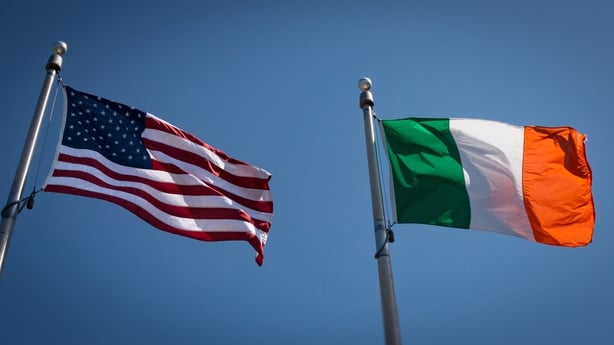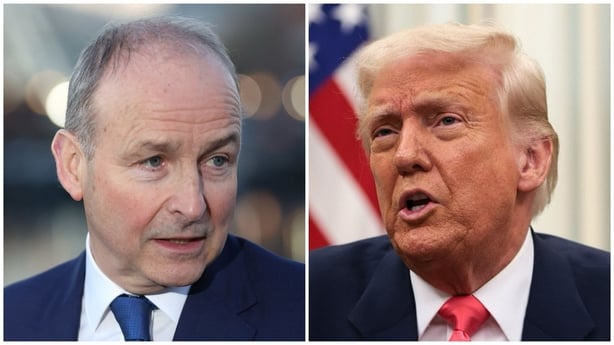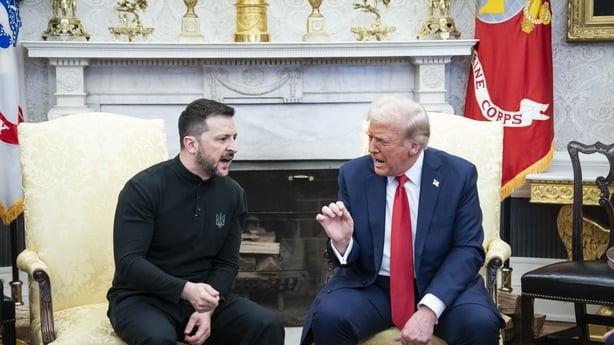Donald Trump is the only US president since JFK who doesn't claim Irish ancestry (although it is said that Bill Clinton’s links were somewhat tenuous).
However, last week President Trump followed the tradition of previous administrations, including his own, to declare March "Irish-American Heritage Month".
"They’re great people," Mr Trump said, as he signed the order in the Oval Office, adding "and they voted for me in heavy numbers, so I like 'em even more".
While data on precise numbers is hard to come by, there is some evidence that voting patterns among Irish Americans - traditionally steeped in Democratic labour union politics - have shifted in recent years, according to Maurice O’Sullivan, retired professor at Rollins College, Florida.
"First of all, we became affluent, and money defines a lot of politics in the United States," he told RTÉ News.
"The Irish are among the wealthier groups in the United States, and as people get money, they become more conservative, more protective of that money," he said.
Mainstream Irish Catholics have also tended to follow much of the clergy, he said and our "institutional clergy has been pretty conservative".
The Pew Research Centre found that churchgoing, white Catholics voted two-to-one for Donald Trump in last year's US presidential election.

Sean Spicer, White House press secretary in the first Trump administration, agreed that Irish-Americans have embraced Republican politics as they have grown richer.
"They've gone from worker to owner in the last couple of generations," he said.
"They see the issues and policies that Donald Trump and the Republican Party champion as more in line with their values now as someone who owns a company or is higher up on the corporate ladder," he added.
However, Congressman Brendan Boyle of Philadelphia - the only member of US Congress with an Irish-born parent - disagreed.
The Irish American vote is a much more nuanced picture, he said.
"The descendants of the Ulster Unionists, or the Scots-Irish, who came to Appalachia and to the south in big numbers have always been conservative and voted accordingly," he said.
"The experience of those folks of which I am descended, who tended to come to places like Philadelphia and Boston and Chicago and New York, is different," Mr Boyle said.
The congressman however did not try to dissuade President Trump that "so many Irish are for him" in the interest of preserving the strength of the Ireland-US relationship at a time the congressman said the US president "is doing everything he can to alienate our traditional European allies".
Donald Trump's sudden withdrawal of US support of Ukraine sent shockwaves through the transatlantic alliance, as did the upbraiding of Ukraine's wartime leader Volodymyr Zelensky by Mr Trump and his second-in-command JD Vance at the White House last month.
So with tensions mounting throughout the continent, are small countries like Ireland in danger of being swept aside as more powerful nations make all the decisions in a shifting global order?

"Look, any relationship you've got to treat with respect," said Mr Spicer, "you are smaller, but that doesn't mean you're not deserving of respect for the culture and the binds that tie us together".
No other country gets the treatment that Ireland gets in the US around St Patrick’s Day, he added.
"You’ve got to remember, basically our entire government pauses for a day and celebrates the relationship between the two countries and our societies".
It is not a time to publicly air grievances, he said.
Unless Ireland is willing to step up on an issue to the size and scope of the United States, whether it's Gaza or Ukraine or trade, he said, coming in and lecturing another leader about what they should do would be "perilous".
"You might get the word in," he said, "but it might be your last visit".
For Congressman Boyle, the breakdown in the transatlantic relationship "is an enormously depressing moment".
But he said he had confidence the Taoiseach would be able to "walk the tightrope" in his meetings with President Trump.

"I would hope that this Taoiseach, who is a very experienced person when it comes to politics, would be able to make clear the Irish objections to American policy, especially Trump's foreign policy," he said, "while at the same time not doing overall damage to the US-Ireland relationship".
"Although, we have a US president in Donald Trump, who really makes a sport of beating up on US allies," he added.
For years, observers have forecast the demise of the special relationship between Ireland and the United States, Mr Boyle said.
"I've been reading "think pieces" for basically my entire lifetime, predicting that the close relationship between the US and Ireland was about to go away.
"And of course, they’ve all been proven wrong," the congressman concluded.







